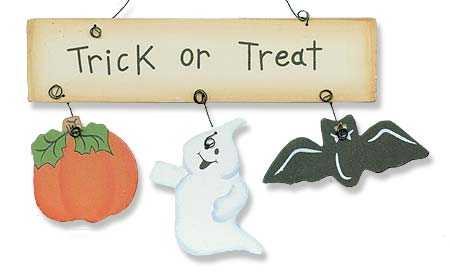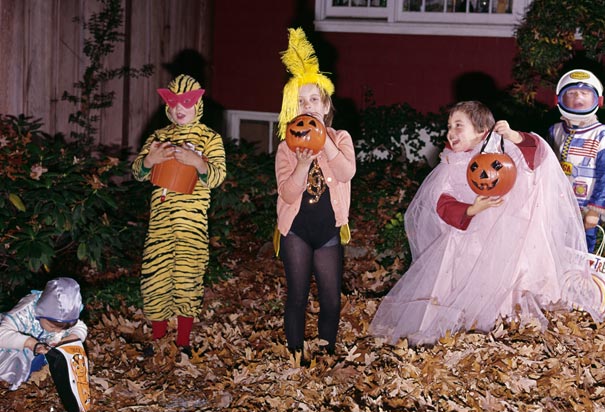Halloween is approaching and to celebrate it at LaborEnglishZone we give you again a very interesting post on the origins of this holiday.
Have a nice Halloween and enjoy the post!
Halloween, celebrated each year on October 31st, is a mix of ancient Celtic practices, Catholic and Roman religious rituals and European folk traditions that blended together over time to create the holiday we know today.
Straddling the line between fall and winter, plenty and paucity and life and death, Halloween is a time of celebration and superstition. Halloween has long been thought of as a day when the dead can return to the earth, and ancient Celts would light bonfires and wear costumes to ward off these roaming ghosts.
The Celtic holiday of Samhain, the Catholic Hallowmas period of All Saints' Day and All Souls' Day and the Roman festival of Feralia all influenced the modern holiday of Halloween. In the 19th century, Halloween began to lose its religious connotation, becoming a more secular community-based children's holiday. Although the superstitions and beliefs surrounding Halloween may have evolved over the years, as the days grow shorter and the nights get colder, people can still look forward to parades, costumes and sweet treats to usher in the winter season.
Ancient Origins of Halloween
Halloween's origins date back to the ancient Celtic festival of Samhain (pronounced sow-in). The Celts, who lived 2,000 years ago in the area that is now Ireland, the United Kingdom, northwest of the Iberian Peninsula and northern France, celebrated their new year on November 1st. This day marked the end of summer and the harvest and the beginning of the dark, cold winter, a time of year that was often associated with human death. Celts believed that on the night before the new year, the boundary between the worlds of the living and the dead became blurred.
On the night of October 31st, they celebrated Samhain, when it was believed that the ghosts of the dead returned to earth. In addition to causing trouble and damaging crops, Celts thought that the presence of the otherworldly spirits made it easier for the Druids, or Celtic priests, to make predictions about the future. For a people entirely dependent on the volatile natural world, these prophecies were an important source of comfort and direction during the long, dark winter.
Today's Traditions
The Halloween tradition of "trick-or-treating" probably dates back to the early All Souls' Day parades in England. During the festivities, poor citizens would beg for food and families would give them pastries called "soul cakes" in return for their promise to pray for the family's dead relatives.
The distribution of soul cakes was encouraged by the church as a way to replace the ancient practice of leaving food and wine for roaming spirits. The practice, which was referred to as "going a-souling" was eventually taken up by children who would visit the houses in their neighborhood and be given ale, food, and money.
The tradition of dressing in costume for Halloween has both European and Celtic roots. Hundreds of years ago, winter was an uncertain and frightening time. Food supplies often ran low and, for the many people afraid of the dark, the short days of winter were full of constant worry. On Halloween, when it was believed that ghosts came back to the earthly world, people thought that they would encounter ghosts if they left their homes. To avoid being recognized by these ghosts, people would wear masks when they left their homes after dark so that the ghosts would mistake them for fellow spirits. On Halloween, to keep ghosts away from their houses, people would place bowls of food outside their homes to appease the ghosts and prevent them from attempting to enter.
If you want to know the full story, visit the History channel
Halloween. The History Channel website. 2010. Available at: http://www.history.com/topics/halloween. Accessed oct 26, 2010.
Considering Halloween from a commercial point of view, we must point out that the average American will spend around $66 on Halloween this year, nearly $6 billion total, making Halloween the second biggest holiday of the year. This is what Newsy reporter, Christine Slusser,ha written:
No tricks-- all treats. Americans are spending scary amounts this Halloween--the good kind of scary. Billings, Montana NBC affiliate KULR-8 reports that despite the spooky economy, Halloween is the second biggest American holiday as far as home decorating sales go.
It takes a ghoulish second to Christmas, of course.
LISA GONEVA: “I expanded this store just to fit this stuff in to my store. I went from 6,000 square feet up to ten.”
SHARON SONG: “Total spending for the holiday is estimated to reach $6-billion, and although costumes make up the majority of that amount, a large portion is spent on candy and decorations.”
One farm in Maryland says 10 per cent of its income for the year comes from pumpkins alone. Voice of America News visited the farm...and noticed just how much muoolah was frightfully flying: “Pumpkins with scary faces, funny faces and almost anything else lit from inside the pumpkin, will decorate front porches across America on Halloween night. The Cliber family spent nearly $70 on pumpkins today. Other families have been making similar purchases.”
Bloomberg Business Week decided the best way to illustrate this recent Halloween boom...was through rhyme: “Just when you think it’s all just for fun, notice shoppers swiping credit cards, one by one. Prices are spiking, like this girls green hair, as everyone scrambles for something to wear. Much to the retailers delight, they rake in the cash, as kids prepare for a huge candy stash.”
...and CNN reports while Halloween sales have been up this year...in previous years-- not so much. So after a few gruesome years, it’s safe to say the Halloween biz is back...for now:
CHRISTINE ROMANS: “Experts say the American consumer is tired of being sick and tired, and that they’re going to go out and spend some discretionary income on Halloween - what do you think?”
ROBERT PINZONE: “That seems to be what’s going on because we are definitely busier than last year. They’re tired of saving pennies, I guess they’re here, they wanna spend some money.”
How much did you shell out for Halloween this season? Did you go all out...or are you saving for Santa?
No copyright infringement intended. For educational, non-commercial purposes only.




No comments:
Post a Comment
Note: Only a member of this blog may post a comment.